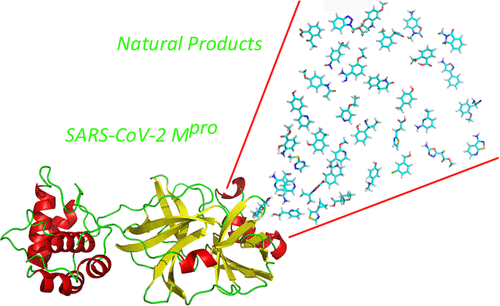Discovery of Diverse Natural Products as Inhibitors of SARS-CoV-2 Mpro Protease through Virtual Screening
Fight against the COVID-19 pandemic continues using different strategies to combat viral infection and preventing its harmful consequences. In addition to vaccines, there is a need to find treatments for the infection once it has occurred.
A few drugs are currently available for the treatment of COVID-19 patients. Specifically, remdesivir alone or combined with the Janus kinase inhibitor baricitinib and more recently, ritonavir are the only antiviral agents against SARS-CoV-2 approved with an emergency use authorization for the treatment of patients with severe symptoms. Presently, clinical treatment of COVID-19 is mainly symptomatic using anti-inflammatory agents like dexamethasone16 or cytokine inhibitors, combined with antibiotics to treat secondary infections. As a result of this, there remains an urgent need for the development of specific antiviral therapeutics against SARS-CoV-2.
The need for a swift response against COVID-19 prompted to consider different sources to identify bioactive compounds that can be used as therapeutic agents, including available drugs and natural products. One of those sources is virtual screening, as it is a reliable procedure for a quick and cost-effective way to discover bioactive compounds from large collections against a specific molecular target.

This work, by professor Jaime Rubio-Martínez et al. reports the results of a robust in silico procedure involving information concerning protein plasticity. Specifically, the study involves a virtual screening of the Selleck database of Natural Compounds containing ∼2000 compounds against a set of diverse conformations of the SARSCoV-2 Mpro protease, characterized from a molecular dynamics study.
Accordingly, they first report the characterization of the dynamical profile of protease in its apo form, using conventional (cMD) as well as Gaussian accelerated molecular dynamics (GaMD) simulations, in the form of a set of structure representatives. These structures were subsequently used to carry out ensemble docking. Then, the binding free energy of the most promising candidates was assessed using two different procedures to finally provide a shortlist of prospective candidates. These compounds were purchased and tested for their ability to inhibit the Mpro protease in vitro. Finally, 11 compounds were purchased and tested in vitro for their capability to inhibit the Mpro protease. Among these, five SARS-CoV-2 antivirals, inhibitors of Mpro, were identified from the database of natural products.
You can read the full article: Discovery of Diverse Natural Products as Inhibitors of SARS-CoV-2 Mpro Protease through Virtual Screening
